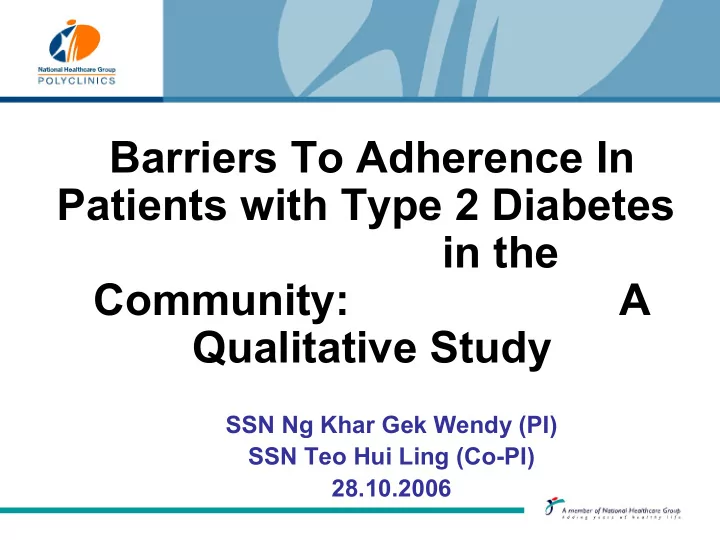

Barriers To Adherence In Patients with Type 2 Diabetes in the Community: A Qualitative Study SSN Ng Khar Gek Wendy (PI) SSN Teo Hui Ling (Co-PI) 28.10.2006
Research Purpose To explore factors that prevent adherence to diabetes management and treatment, from patients’ perspective
Significance of Study • Prevalence of Diabetes Mellitus in Singapore is 8.2% • Leading cause of End-stage Renal Failure and blindness in adults • Annually, 700 lower extremity amputations • 8 th commonest cause of death MOH Clinical Practice Guidelines for Diabetes Mellitus (2006)
Literature Review In U.S.A. and four European countries, a qualitative study was conducted on 123 patients with Type 2 diabetes, regarding issues and barriers related to patient compliance – Well-motivated on compliance to diet and lifestyle – Many felt that the information about the disease, prescribed treatment, lifestyle and diet were inadequately explained Frandsen & Kristensen, 2002
Methodology • Phenomenology approach with purposive sampling • 10 participants were selected from Hougang and Woodlands Polyclinics • Four individual interviews and one focus group interview • Structured questionnaires and recorded interviews • Data coded and analysed
Ethical Consideration • DSRB and Research Committee of National Healthcare Group Polyclinics • Informed consent was obtained • Participants’ anonymity and confidentiality assured • All tape interviews destroyed after the research
Demographic Profile Gender Male 3 30% Female 7 70% Age 40 – 50 3 30% 51 – 60 4 40% 61 – 70 2 20% 71 - 80 1 10% Duration with < 5 years 1 10% DM 5 – 9 years 2 20% 10 – 14 years 4 40% > 15 years 3 30% Diabetes Diet 1 10% Treatment Diet + OHGA 6 60% Diet + OHGA + Insulin 3 30%
Results 2 Categories : • Participants’ views on healthcare professionals’ management • Participants’ views on expected lifestyle changes
Participants’ Views On Healthcare Professionals’ Management 1 st Theme - Trust in medical competencies “ They are definitely well-trained”. “There are many things that only doctors and nurses (can) help ….” “(Doctor’s) decision is correct… my body is ok (after management)”.
Participants’ Views On Healthcare Professionals’ Management 2 nd Theme - Unsatisfied relationships with healthcare professionals “I really know they are nice people, but they do not know what we need.” “I was very discouraged by one or two doctors … they don’t want to give you their listening ear to our family problems”.
Participants’ Views On Lifestyle Changes 1st Theme - Personal beliefs and rights “.. I think all this is up to individual to decide what they want to do…I took my medication as and when I need to and when I feel like to.” “I know that the nurses’ education does make me understand my condition better but it really depends on me to decide..” “You can tell us what to do but whether we want to accept it or not, it is up to us to decide.”
Participants’ Views On Lifestyle Changes 2 nd Theme – Poor health perception on severity of glycaemic control “…Now I am young, I know I can take it, no problem” “The way I eat and take my medicine, whatever I want to eat… I never control my diet… I take it easy”
Participants’ Views On Lifestyle Changes 3 r d Theme - Lack of discipline “I am very lazy… once you are lazy you can’t be bothered to go down and exercise.” “When I go on holiday, I forget all about my diet.” “I can go buffet maybe twice a week… I love eating.. I love fruits.. I love milo.” “I feel very guilty, much as I want to do (behavior changes) the spirit is willing but then the flesh sometimes is weak.”
Limitations • Results cannot be generalized to the whole population • Sometimes, responses from the focus group, got carried off from the themes
Moving Forward
Clinical Implications • Evolving characteristics of patients – Higher expectations – Personal autonomies and rights • Altered perception of health – Casual attitude to glycaemic control • Lack of discipline – Adherence to management plans
Clinical Implications • Change of counseling tactics – Motivate and engage patients instead of didactic sessions • Constant reflection of own practice – Faith in patients – Be more understanding and empathetic
Conclusions • Management of patients with Type 2 Diabetes Mellitus is challenging • Explore and bridge the knowledge–behavior gap • Go beyond standard nurse counseling and education – apply motivational therapies, manage resistance to lifestyle changes
References • Ministry of Health Clinical Practice Guidelines3/2006. Diabetes Mellitus. Singapore. • Frandsen, K.B. and Kristensen, J.S. (2002). Diet and lifestyle in type 2 diabetes: the patient’s perspective. Practical Diabetic International, 19 (3), 77-80. • Vermeire, E., Royen, P.V., Coenen, S., Wens, J. and Deneken, J. (2003). The adherence of type 2 diabetes to their therapeutic regimens: a qualitative study from the patient’s perspective. Practical Diabetes International, Vo,. No.6., 209-214
Acknowledgement Dr. Yvette Tan, Head (Hougang Polyclinic) Doris Liew, Director (Nursing) Jancy Mathews, Assistant Director (Nursing) Elizabeth Ho, Senior Staff Nurse Marine Chioh, Senior Staff Nurse
THANK-YOU
Recommend
More recommend